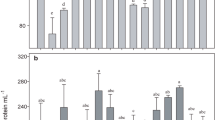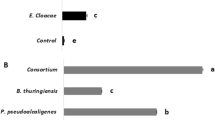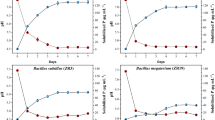Abstract
Greenhouse bioassays were used to examine the ability of selected strains of the rhizobacteria Sinorhizobium meliloti, Bacillus flexus and B. megaterium to solubilize phosphorus (P) and to affect growth promotion and phosphorus nutrition in maize. These bacterial strains were found to decrease the pH and solubilize some forms of insoluble P, such as tricalcium phosphate and hydroxyapatite, as well as to exhibit acid and alkaline phosphatase enzymatic activities in culture medium, properties that are possibly involved in P solubilization. Inoculation of the strains separately and as a consortium of the three bacteria (S. meliloti, B. flexus and B. megaterium) in P-deficient soil (4.33 w/v P) fertilized without P improved plant height, shoot and root dry weight, as well as P nutrition in the maize plants. Use of the B. flexus and B. megaterium strains separately and in a consortium positively affected several growth parameters and P nutrition in plants supplemented with insoluble P. No effect was observed when pots in which the seedlings were growing were supplied with soluble fertilizer. A second assay using a P-deficient soil (6.64 w/v P) showed that inoculation with the consortium of B. flexus and B. megaterium significantly increased growth and total P content in maize plants. A dose–response P fertilization experiment using sterile P-deficient soil led us to conclude that inoculation to soil of the mixture of B. flexus and B. megaterium may improve P nutrition and growth to a level previously attained by the addition of soluble P-fertilizer at 40 w/v P. A non-sterile experiment showed a beneficial response with B. megaterium but not with B. flexus. We propose utilizing these bacteria in P-deficient alkaline soils in future field trials in order to evaluate their potential as biofertilizers.



Similar content being viewed by others
References
Bago B, Pfeffer PE, Shachar-Hill Y (2000) Carbon metabolism and transport in arbuscular mycorrhizas. Plant Physiol 124:949–958. https://doi.org/10.1104/pp.124.3.949
Bashan Y, de-Bashan LE (2010) How the plant growth-promoting bacterium Azospirillum promotes plant growth—a critical Assessment. In: Donald LS (ed) Advances in agronomy, vol 108. Academic Press, New York, pp 77–136. https://doi.org/10.1016/S0065-2113(10)08002-8
Bashan Y, Kamnev AA, de-Bashan LE (2013) Tricalcium phosphate is inappropriate as a universal selection factor for isolating and testing phosphate-solubilizing bacteria that enhance plant growth: a proposal for an alternative procedure. Biol Fertil Soils 49:465–479. https://doi.org/10.1007/s00374-012-0737-7
Bianco C, Defez R (2010) Improvement of phosphate solubilization and Medicago plant yield by an indole-3-acetic acid-overproducing strain of Sinorhizobium meliloti. Appl Environ Microbiol 76:4626–4632. https://doi.org/10.1128/AEM.02756-09
Chen Y, Rekha P, Arun A, Shen F, Lai W-A, Young C (2006) Phosphate solubilizing bacteria from subtropical soil and their tricalcium phosphate solubilizing abilities. Appl Soil Ecol 34:33–41 https://doi.org/10.1016/j.apsoil.2005.12.002
Collavino MM, Sansberro PA, Mroginski LA, Aguilar OM (2010) Comparison of in vitro solubilization activity of diverse phosphate-solubilizing bacteria native to acid soil and their ability to promote Phaseolus vulgaris growth. Biol Fertil Soils 46:727–738. https://doi.org/10.1007/s00374-010-0480-x
De Freitas J, Banerjee M, Germida J (1997) Phosphate-solubilizing rhizobacteria enhance the growth and yield but not phosphorus uptake of canola (Brassica napus L.). Biol Fertil Soils 24:358–364. https://doi.org/10.1007/s003740050258
De-Bashan LE, Hernandez J-P, Bashan Y, Maier RM (2010) Bacillus pumilus ES4: candidate plant growth-promoting bacterium to enhance establishment of plants in mine tailings. Environ Exp Bot 69:343–352. https://doi.org/10.1016/j.envexpbot.2010.04.014
Dick CF, Dos-Santos ALA, Meyer-Fernandes JR (2011) Inorganic phosphate as an important regulator of phosphatases. Enzyme Res 2011:103980. https://doi.org/10.4061/2011/103980
Egamberdiyeva D (2007) The effect of plant growth promoting bacteria on growth and nutrient uptake of maize in two different soils. Appl Soil Ecol 36:184–189. https://doi.org/10.1016/j.apsoil.2007.02.005
Figueroa-López AM, Cordero-Ramírez JD, Martínez Álvarez JC, López-Meyer M, Lizárraga-Sánchez GJ, Félix Gastélum R, Castro-Martínez C, Maldonado-Mendoza IE (2016) Rhizospheric bacteria of maize with potential for biocontrol of Fusarium verticillioides. Springer Plus 5:330. https://doi.org/10.1186/s40064-016-1780-x
Gilbert N (2009) Environment: the disappearing nutrient. Nature 461:716–718. https://doi.org/10.1038/461716a
Gurdeep K, Reddy MS (2015) Effects of phosphate-solubilizing bacteria, rock phosphate and chemical fertilizers on maize-wheat cropping cycle and economics. Pedosphere 25:428–437. https://doi.org/10.1016/S1002-0160(15)30010-2
Hameeda B, Harini G, Rupela O, Wani S, Reddy G (2008) Growth promotion of maize by phosphate-solubilizing bacteria isolated from composts and macrofauna. Microbiol Res 163:234–242. https://doi.org/10.1016/j.micres.2006.05.009
Han H-S, Lee K (2006) Effect of co-inoculation with phosphate and potassium solubilizing bacteria on mineral uptake and growth of pepper and cucumber. Plant Soil Environ 52:130–136
Harvey PR, Warren RA, Wakelin S (2009) Potential to improve root access to phosphorus: the role of non-symbiotic microbial inoculants in the rhizosphere. Crop Past Sci 60:144–151. https://doi.org/10.1071/CP08084
Hidayat BJ, Eriksen NT, Wiebe MG (2006) Acid phosphatase production by Aspergillus niger N402A in continuous flow culture. FEMS Microbiol Lett 254:324–331. https://doi.org/10.1111/j.1574-6968.2005.00045.x
Juma NG, Tabatabai MA (1988) Phosphatase activity in corn and soybean roots: conditions for assay and effects of metals. Plant Soil 107:39–47. https://doi.org/10.1007/bf02371542
Kapri A, Tewari L (2010) Phosphate solubilization potential and phosphatase activity of rhizospheric Trichoderma spp. Braz J Microbiol 41:787–795. https://doi.org/10.1590/S1517-83822010005000001
Kirkpatrick DS, Bishop SH (1971) Simplified wet ash procedure for total phosphorus analysis of organophosphonates in biological samples. Anal Chem 43:1707–1709. https://doi.org/10.1021/ac60306a046
Kpomblekou-a K, Tabatabai M (1994) Effect of organic acids on release of phosphorus from phosphate rocks. Soil Sci 158:442. https://doi.org/10.1097/00010694-199415860-00006
Lavakush YJ, Verma JP, Jaiswal DK, Kumar A (2014) Evaluation of PGPR and different concentration of phosphorus level on plant growth, yield and nutrient content of rice (Oryza sativa). Ecol Eng 62:123–128. https://doi.org/10.1016/j.ecoleng.2013.10.013
Leyva-Madrigal KY, Larralde-Corona CP, Apodaca-Sánchez MA, Quiroz-Figueroa FR, Mexia-Bolaños PA, Portillo-Valenzuela S, Ordaz-Ochoa J, Maldonado-Mendoza IE (2015) Fusarium species from the Fusarium fujikuroi species complex involved in mixed infections of maize in northern Sinaloa, Mexico. J Phytopathol 163:486–497. https://doi.org/10.1111/jph.12346
Lizárraga-Sánchez GJ, Leyva-Madrigal KY, Sánchez-Peña P, Quiroz-Figueroa FR, Maldonado-Mendoza IE (2015) Bacillus cereus sensu lato strain B25 controls maize stalk and ear rot in Sinaloa, Mexico. Field Crops Res 176:11–21. https://doi.org/10.1016/j.fcr.2015.02.015
Lopez-Arredondo DL, Leyva-González MA, González-Morales SI, López-Bucio J, Herrera-Estrella L (2014) Phosphate nutrition: improving low-phosphate tolerance in crops. Annu Rev Plant Biol 65:95–123. https://doi.org/10.1146/annurev-arplant-050213-035949
López-Bucio J, Campos-Cuevas JC, Hernández-Calderón E, Velásquez-Becerra C, Farías-Rodríguez R, Macías-Rodríguez LI, Valencia-Cantero E (2007) Bacillus megaterium rhizobacteria promote growth and alter root-system architecture through an auxin-and ethylene-independent signaling mechanism in Arabidopsis thaliana. Mol Plant Mic Interact 20:207–217. https://doi.org/10.1094/ MPMI -20-2-0207
Marciano-Marra L, Sousa-Soares CRF, de Oliveira SM, Avelar-Ferreira PA, Lima-Soares B, de Fráguas-Carvalho R, de Lima JM, de Souza Moreira FM (2012) Biological nitrogen fixation and phosphate solubilization by bacteria isolated from tropical soils. Plant Soil 357: 289–307. https://doi.org/10.1007/s11104-012-1157-z
Murphy J, Riley JP (1962) A modified single solution method for the determination of phosphate in natural waters. Anal Chim Acta 27:31–36. https://doi.org/10.1016/S0003-2670(00)88444-5
Nagy R, Drissner D, Amrhein N, Jakobsen I, Bucher M (2009) Mycorrhizal phosphate uptake pathway in tomato is phosphorus repressible and transcriptionally regulated. New Phytol 181:950–959. https://doi.org/10.1111/j.1469-8137.2008.02721.x
Nath R, Sharma G, Barooah M (2012) Efficiency of tricalcium phosphate solubilization by two different endophytic Penicillium sp. isolated from tea (Camellia sinensis L.). Eur J Exp Biol 2:1354–1358
Öhlinger R, Schinner F, Kandeler E, Margesin R (1996) Methods in soil biology. Springer-Verlag, Berlin Heidelberg
Oliveira C et al (2009) Phosphate solubilizing microorganisms isolated from rhizosphere of maize cultivated in an oxisol of the Brazilian Cerrado biome. Soil Biol Biochem 41:1782–1787. https://doi.org/10.1016/j.soilbio.2008.01.012
Olsen SR, Cole CV, Watanabe FS (1954) Estimation of available phosphorous in soils by extraction with sodium bicarbonate. USDA Circ 939. U.S. Department of Agriculture, Washington DC
Pereira SIA, Castro PML (2014) Phosphate-solubilizing rhizobacteria enhance Zea mays growth in agricultural P-deficient soils. Ecol Eng 73:526–535. https://doi.org/10.1016/j.ecoleng.2014.09.060
Ramírez Soto M, Hernández Espinal LA, González González D, Astengo Cázares H, Moreno Gallegos T, Reyes Jiménez JE, Loaiza Meza A, Valdéz Amaya J, Borbón Gracía A (2010). Guía técnica para el área de influencia del Campo Experimental del valle de Culiacán. Fundación Produce, Sinaloa A.C
Richardson AE (2001) Prospects for using soil microorganisms to improve the acquisition of phosphorus by plants. Funct Plant Biol 28:897–906. https://doi.org/10.1071/PP01093.
Richardson AE, Barea J-M, McNeill AM, Prigent-Combaret C (2009) Acquisition of phosphorus and nitrogen in the rhizosphere and plant growth promotion by microorganisms. Plant Soil 321:305–339. https://doi.org/10.1007/s11104-009-9895-2
Richardson AE, Lynch JP, Ryan PR, Delhaize E, Smith FA, Smith SE, Harvey PR, Ryan MH, Veneklaas EJ, Lambers H, Oberson A, Culvenor RA, Simpson RJ (2011) Plant and microbial strategies to improve the phosphorus efficiency of agriculture. Plant Soil 349:121–156. https://doi.org/10.1007/s11104-011-0950-4
Rojas A, Holguin G, Glick BR, Bashan Y (2001) Synergism between Phyllobacterium sp.(N2-fixer) and Bacillus licheniformis (P-solubilizer), both from a semiarid mangrove rhizosphere. FEMS Microbiol Ecol 35:181–187. https://doi.org/10.1111/j.1574-6941.2001.tb00802.x
Ryan J, Estefan G, Rashid A (2007) Soil and plant analysis laboratory manual. International Center for Agriculture Research in the Dry Areas (ICARDA), Beirut, Lebanon
Sharma SB, Sayyed RZ, Trivedi MH, Gobi TA (2013) Phosphate solubilizing microbes: sustainable approach for managing phosphorus deficiency in agricultural soils. Springer Plus 2:587. https://doi.org/10.1186/2193-1801-2-587
Shen J, Yuan L, Zhang J, Li H, Bai Z, Chen X, Zhang W, Zhang F (2011) Phosphorus dynamics: from soil to plant. Plant Physiol 156:997–1005. https://doi.org/10.1104/pp.111.175232
SIAP-SAGARPA (2016) Servicio de Información Agroalimentaria y Pesquera–Secretaria de Agricultura, Ganaderia, Desarrollo Rural, Pesca y Alimentación. http://www.sagarpa.gob.mx
Smith VH, Schindler DW (2009) Eutrophication science: where do we go from here? Trends Ecol Evol 24:201–207. https://doi.org/10.1016/j.tree.2008.11.009
Sridevi M, Mallaiah K (2009) Phosphate solubilization by Rhizobium strains. Indian J Microbiol 49:98–102. https://doi.org/10.1007/s12088-009-0005-1
Tilman D, Cassman KG, Matson PA, Naylor R, Polasky S (2002) Agricultural sustainability and intensive production practices. Nature 418:671–677. https://doi.org/10.1038/nature01014
Turan M, Gulluce M, von Wirén N, Sahin F (2012) Yield promotion and phosphorus solubilization by plant growth–promoting rhizobacteria in extensive wheat production in Turkey. J Plant Nut Soil Sci 175:818–826. https://doi.org/10.1002/jpln.201200054
Vacheron J, Desbrosses G, Bouffaud M-L, Touraine B, Prigent-Combaret C (2014) Plant growth-promoting rhizobacteria and root system functioning. Front Plant Sci 4:356. https://doi.org/10.3389/fpls.2013.00356
Vessey JK (2003) Plant growth promoting rhizobacteria as biofertilizers. Plant Soil 255:571–586. https://doi.org/10.1023/a:1026037216893
Young L-S, Hameed A, Peng S-Y, Shan Y-H, Wu SP (2013) Endophytic establishment of the soil isolate Burkholderia sp. CC-Al74 enhances growth and P-utilization rate in maize (Zea mays L.) Appl Soil Ecol 66:40–47. https://doi.org/10.1016/j.apsoil.2013.02.001
Yu X, Liu X, Zhu TH, Liu GH, Mao C (2011) Isolation and characterization of phosphate-solubilizing bacteria from walnut and their effect on growth and phosphorus mobilization. Biol Fertil Soils 47:437–446. https://doi.org/10.1007/s00374-011-0548-2
Zahid M (2015) Isolation and identification of indigenous plant growth promoting rhizobacteria from Himalayan region of Kashmir and their effect on improving growth and nutrient contents of maize (Zea mays L.) Front Microbiol 6:207. https://doi.org/10.3389/fmicb.2015.00207
Zaidi A, Khan M, Ahemad M, Oves M, Wani PA (2009) Recent advances in plant growth promotion by phosphate-Solubilizing microbes. In: Khan MS, Zaidi A, Musarrat J (eds) Microbial strategies for crop improvement. Springer, Berlin Heidelberg, pp 23–50. https://doi.org/10.1007/978-3-642-01979-1_2
Zhao K, Penttinen P, Zhang X, Ao X, Liu M, Yu X, Chen Q (2014) Maize rhizosphere in Sichuan, China, hosts plant growth promoting Burkholderia cepacia with phosphate solubilizing and antifungal abilities. Microbiol Res 169:76–82. https://doi.org/10.1016/j.micres.2013.07.003
Acknowledgements
This work was supported by the Secretaría de Investigación y Posgrado del Instituto Politécnico Nacional (SIP-IPN) (2014-2016). JAIG received M.Sc. fellowships from the Consejo Nacional de Ciencia y Tecnología (CONACyT) and the Programa de Becas de Estímulo Institucional de Formación de Investigadores (2014–2016).
Author information
Authors and Affiliations
Corresponding author
Rights and permissions
About this article
Cite this article
Ibarra-Galeana, J.A., Castro-Martínez, C., Fierro-Coronado, R.A. et al. Characterization of phosphate-solubilizing bacteria exhibiting the potential for growth promotion and phosphorus nutrition improvement in maize (Zea mays L.) in calcareous soils of Sinaloa, Mexico. Ann Microbiol 67, 801–811 (2017). https://doi.org/10.1007/s13213-017-1308-9
Received:
Accepted:
Published:
Issue Date:
DOI: https://doi.org/10.1007/s13213-017-1308-9




